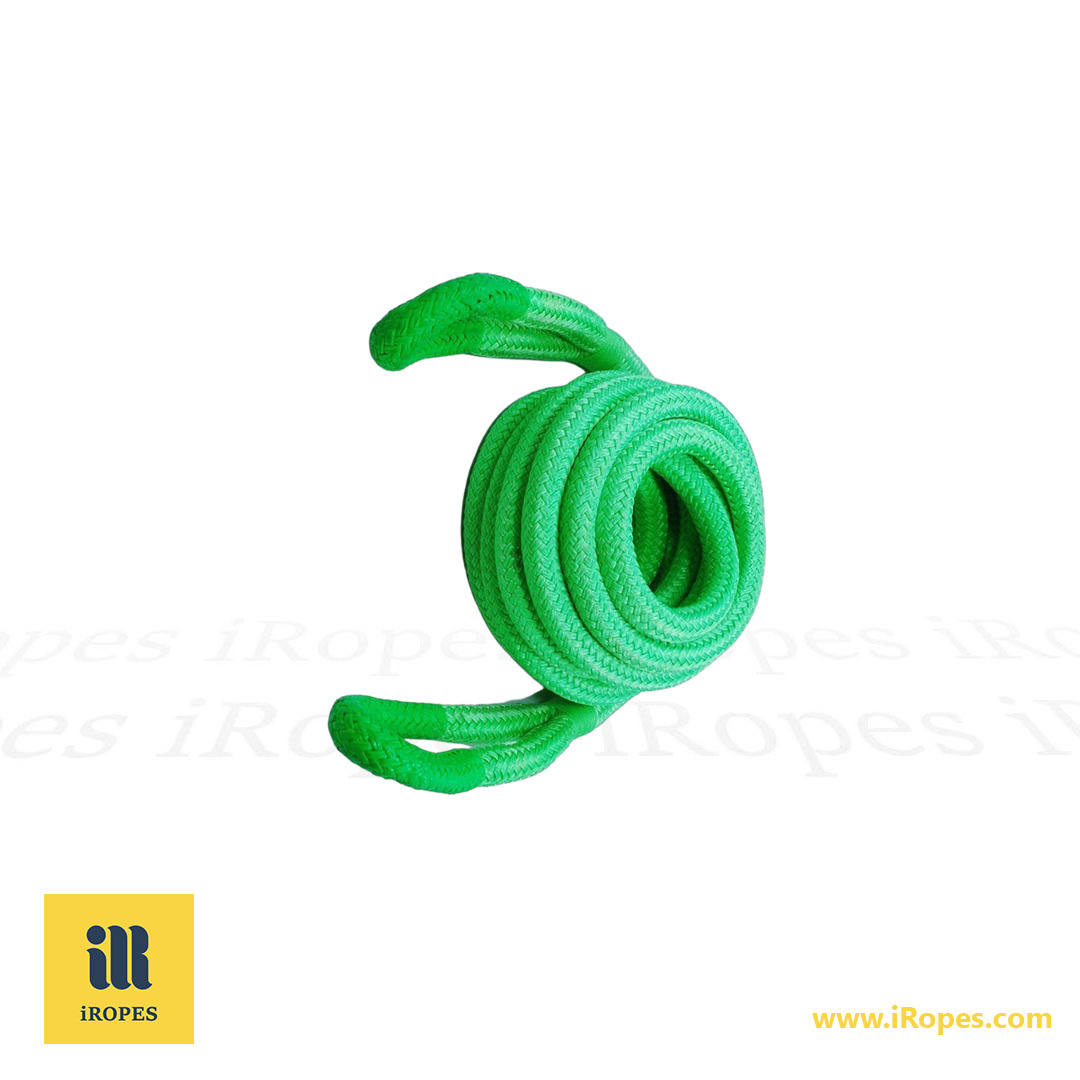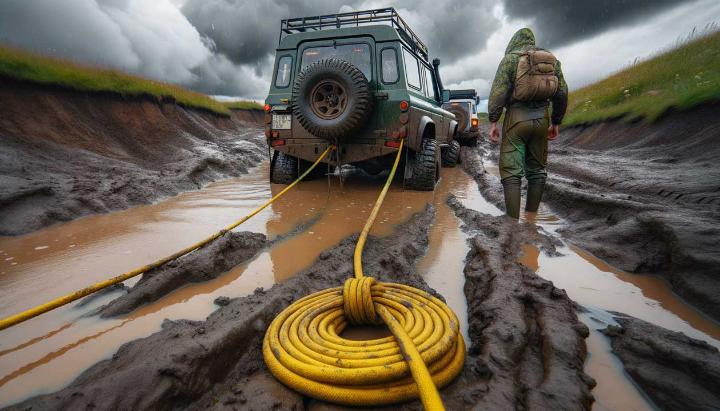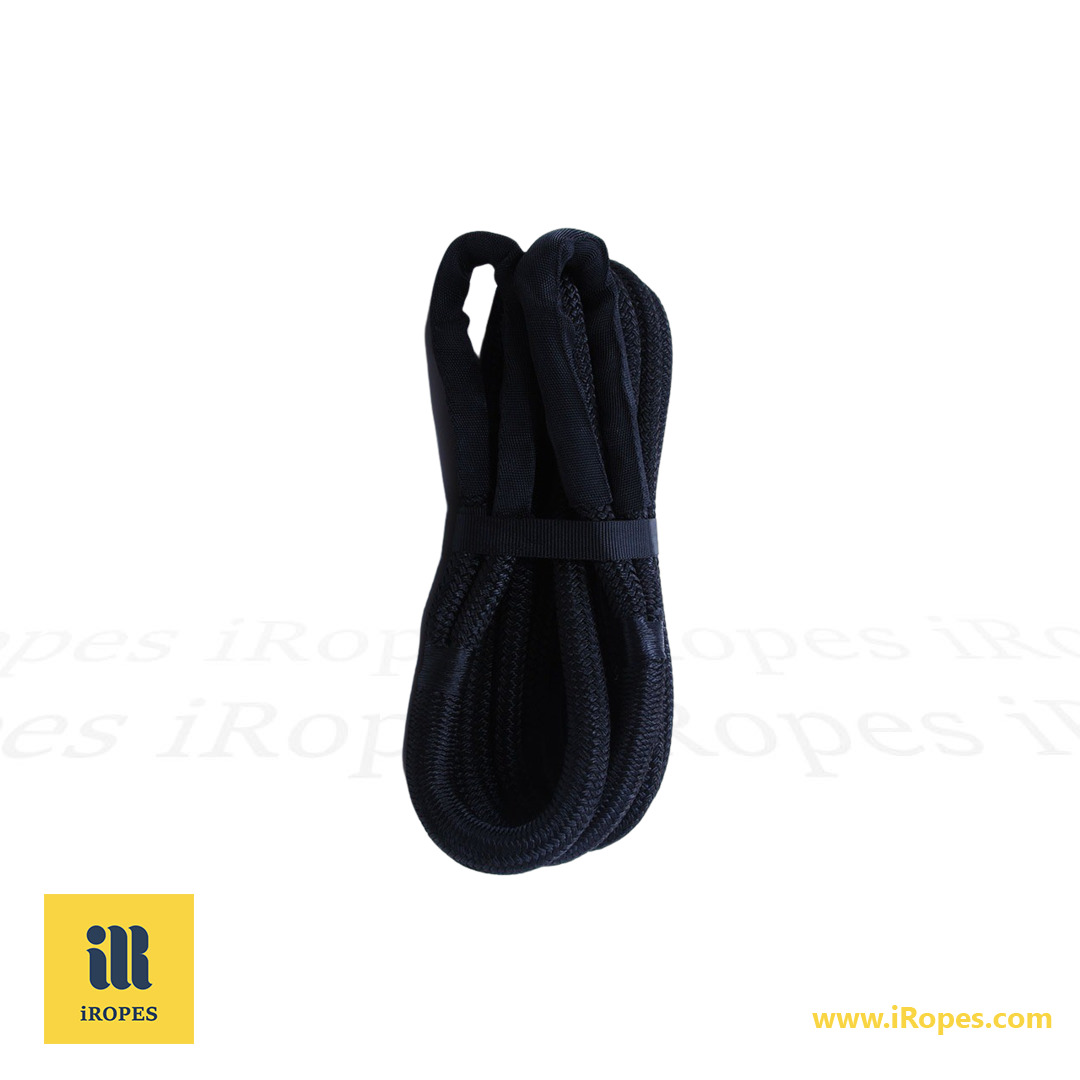Have you ever found yourself in a sticky situation, your 4x4 bogged down in seemingly endless mud? Enter the unsung hero of off-road adventures: the nylon tow rope. But not just any rope - we're talking about a game-changer that's come a long way in revolutionising vehicle recovery.
Imagine a tow rope that doesn't just pull, but stretches with purpose. Our high-performance nylon tow ropes boast an impressive elasticity that's turning heads in the off-road community. With a stretch capacity of 20-30%, these long elastic ropes are redefining what's possible in vehicle recovery.
But why should you care about a rope's stretchiness? It's simple: safety, efficiency, and peace of mind. A long tow rope with high elasticity acts like a shock absorber, smoothing out the jolts and jerks that can damage vehicles during recovery. It's not just about getting unstuck - it's about doing it with finesse.
In this post, we'll dive deep into the benefits of nylon tow ropes, exploring how their long elastic properties are transforming vehicle recovery. Whether you're a seasoned off-roader or just someone who likes to be prepared, you'll discover why these ropes have become an essential tool in any adventure kit. Get ready to stretch your understanding of tow rope technology!
Nylon Tow Ropes: Superior Strength and Durability for Vehicle Recovery
MATERIAL: Nylon core Nylon cover
CONSTRUCT: double braided
ELONGATION: 30%
When it comes to vehicle recovery, the strength and durability of your tow rope can make all the difference between a smooth rescue and a potentially dangerous situation. That's where nylon tow ropes truly shine, offering unparalleled performance that has revolutionised the world of vehicle recovery.
Benefits of Nylon in Tow Rope Construction
Nylon tow ropes have become the go-to choice for serious off-roaders and recovery specialists alike, and for good reason. The unique properties of nylon fibres provide a winning combination of strength, elasticity, and resilience that other materials simply can't match.
- Exceptional tensile strength: High-quality nylon fibres can withstand immense pulling forces, ensuring your tow rope won't snap under pressure.
- Impressive stretch capacity: Nylon's natural elasticity allows the rope to absorb shock and reduce jerking during recovery, protecting both vehicles from sudden jolts.
- Remarkable durability: Resistant to abrasion, UV rays, and moisture, nylon tow ropes maintain their performance even in harsh conditions.
Choosing the Right Kinetic Recovery Rope for Your Vehicle
When selecting a nylon tow rope, it's crucial to consider the specific needs of your vehicle and the types of recovery situations you might encounter. Here are some key factors to keep in mind:
Key Considerations
1. Vehicle weight: Choose a rope with a breaking strength at least 3 times your vehicle's weight.
2. Rope diameter: Thicker ropes generally offer higher breaking strength.
3. Kinetic properties: Look for ropes designed to absorb and release energy during recovery.
Remember, a high-quality nylon tow rope is an investment in your safety and peace of mind. By choosing a rope that's tailored to your needs, you'll be well-prepared for any recovery scenario you might encounter on the trail or road.
Have you ever experienced the difference a good nylon tow rope can make in a tough recovery situation? Share your stories in the comments below – we'd love to hear how these robust ropes have come to your rescue!
Long Tow Ropes: Versatility and Convenience for All Vehicles
When it comes to vehicle recovery, the length of your tow rope can make all the difference. Long tow ropes offer unparalleled versatility and convenience, making them a must-have for any off-road enthusiast or professional recovery team. Let's dive into why these extended lifelines are so valuable in various towing scenarios.
Extended Length: A Game-Changer in Towing Flexibility
The primary advantage of a long tow rope lies in its extended reach. Typically ranging from 50 to 65 feet, these ropes provide ample length to handle a wide variety of recovery situations. Imagine you're out on a muddy trail, and your mate's 4x4 is stuck in a bog 40 feet away. With a standard short rope, you'd be out of luck. But with a long tow rope, you can easily bridge the gap and pull them to safety.

Versatility Across Vehicle Types and Sizes
One of the beauties of a long tow rope is its adaptability to different vehicle types and sizes. Whether you're recovering a compact car or a heavy-duty truck, a long rope gives you the flexibility to maintain a safe distance between vehicles during the towing process. This versatility is particularly handy when dealing with uneven terrain or tight spaces where manoeuvrability is limited.
- Compact cars to SUVs: Long ropes accommodate the varying lengths of different vehicle types.
- Heavy-duty trucks: Extended length allows for proper weight distribution during recovery of larger vehicles.
- Recreational vehicles: Ideal for towing campers or boats in tricky situations.
Convenience Features That Make a Difference
Modern long tow ropes come packed with convenient features that enhance their usability and safety. Look for ropes with reinforced loops on both ends for easy attachment to tow hooks. Some even come with protective sleeves to prevent abrasion and extend the rope's lifespan. And for those nighttime recoveries, reflective tracers woven into the rope provide crucial visibility.
Have you ever been in a situation where a longer tow rope would have made your recovery efforts easier? Share your experiences in the comments below – we'd love to hear how a long tow rope could have saved the day!
Pro Tip: Choosing the Right Length
For optimal versatility, aim for a tow rope between 50-65 feet long. This range covers most recovery scenarios while remaining manageable.
Remember, while a long tow rope offers incredible flexibility, it's crucial to use it correctly. Always follow proper safety procedures and consult your vehicle's manual for specific towing guidelines. With the right long tow rope in your recovery kit, you'll be prepared for almost any situation the great outdoors can throw at you.
Long Elastic Rope: Enhancing Safety and Performance
An upgraded version of our successful line of Globe ropes. 24-plait nylon
cover and its specially coated UHMWPE core allow users to strip the cover
off this rope and, adapt it specifically to the existing conditions on board.
MATERIAL: Uhmwpe-nylon
CONSTRUCT: 12 /24x2
ELONGATION: 4.8%
When it comes to towing and recovery, the elastic properties of a long rope can make a world of difference. Let's dive into how these stretchy marvels enhance both safety and performance, revolutionising the way we approach vehicle recovery and beyond.
The Science Behind Elastic Ropes
Elastic ropes, particularly those made from high-quality nylon, possess a unique ability to stretch and recoil. This elasticity isn't just a neat party trick - it's a game-changer in terms of safety and efficiency. As someone who's spent countless hours testing various ropes in challenging conditions, I can attest to the remarkable difference a good elastic rope makes.
- Shock absorption: The rope's ability to stretch acts as a buffer, absorbing the initial shock of movement and reducing the risk of sudden jerks.
- Energy distribution: By elongating, the rope distributes the force of the pull over a longer period, making the recovery process smoother and more controlled.
- Reduced wear and tear: The elastic properties help minimise stress on both the towing vehicle and the one being recovered, potentially saving you from costly repairs down the line.
Safety First: How Elastic Ropes Protect Your Vehicle
Safety isn't just a buzzword when it comes to vehicle recovery - it's absolutely crucial. I remember a particularly hairy situation where a rigid rope snapped during a recovery attempt, narrowly missing my mate's windshield. That's when I truly appreciated the value of a quality elastic rope.
Did you know? A good elastic rope can reduce the peak force on vehicle attachment points by up to 50%, significantly lowering the risk of damage during recovery.
The elasticity of these ropes provides a crucial safety buffer:
- Gradual force application: Instead of a sudden jolt, the force is applied gradually, reducing the risk of vehicle damage or rope failure.
- Improved control: The elastic properties allow for better control during the recovery process, especially on uneven terrain.
- Snatch prevention: The rope's ability to stretch helps prevent dangerous 'snatching' that can occur with rigid ropes.
Performance Boost: Getting the Job Done Efficiently
Beyond safety, elastic ropes significantly enhance performance in recovery situations. Their unique properties allow for more efficient and effective recoveries, often making the difference between a quick pull-out and a long, frustrating ordeal.
- Energy storage: As the rope stretches, it stores energy which is then released to help 'pull' the stuck vehicle.
- Smoother operation: The elasticity results in a smoother, more controlled recovery process, reducing the risk of wheels spinning or digging in further.
- Versatility: Long elastic ropes are suitable for a wide range of vehicles and recovery scenarios, from small cars to large 4x4s.
Have you ever used an elastic rope for vehicle recovery? I'd love to hear about your experiences in the comments below. Whether you're a seasoned off-roader or someone who likes to be prepared for any situation, understanding the benefits of long elastic ropes can make a world of difference in your next recovery operation.
Pro Tip: Choosing Your Elastic Rope
Look for a nylon rope with 20-30% stretch capacity for optimal performance in vehicle recovery situations. Learn more about our strongest nylon ropes for off-road adventures.
Remember, while elastic ropes offer significant advantages, they're not a substitute for proper recovery techniques and safety precautions. Always ensure you're using the right equipment for your specific situation and follow recommended safety guidelines. With the right knowledge and tools, you'll be well-prepared for whatever challenges the road (or off-road) might throw your way.
Rope Technology Advancements: A Journey of Innovation and Reliability
As an off-road enthusiast and recovery specialist, I've witnessed firsthand how rope technology has come a long way over the years. The evolution of tow ropes, particularly nylon varieties, has been nothing short of remarkable. Let's take a journey through time and explore how these essential tools have transformed to meet the demands of modern vehicle recovery.
Historical Development of Rope Manufacturing
Believe it or not, rope-making is an ancient art that dates back at least 28,000 years. I remember visiting a museum in Egypt and marvelling at the rope-making techniques developed by ancient Egyptians - some of which are still used today! It's fascinating to think about how these early innovators laid the groundwork for the ropes we use in our 4x4 adventures.
The real game-changer came during the Industrial Revolution. In 1834, the first practical use of steel wire rope marked a significant milestone. This innovation paved the way for stronger, more durable ropes capable of handling increasingly heavy loads.
Modern Innovations in Rope Materials and Design
Fast forward to today, and we're looking at a whole new ballgame. The introduction of synthetic fibres has revolutionised rope performance, especially in the realm of vehicle recovery. As someone who's tested countless ropes in challenging conditions, I can tell you that the difference is night and day.
- Nylon fibres: These offer exceptional strength-to-weight ratios and impressive elasticity, perfect for absorbing shock during recovery operations.
- Polyester blends: These provide excellent UV resistance and low stretch properties, ideal for static line applications.
- HMPE (High-Modulus Polyethylene): This ultra-strong, lightweight material is making waves in specialised recovery scenarios.
One of the most exciting recent developments is the kinetic recovery rope. These ropes are designed to stretch and recoil, storing energy and then releasing it to help pull a stuck vehicle out of trouble. I remember the first time I used one - it felt like magic compared to the old static ropes I was used to!

Improving Reliability and Efficiency in Rope Applications
The advancements in rope technology haven't just made our recovery operations more effective - they've made them safer too. Modern manufacturing techniques have dramatically improved consistency and quality, giving us ropes we can truly rely on when the going gets tough.
For instance, precision braiding techniques now allow for ropes with incredibly high breaking strengths. I've seen ropes half the diameter of old ones that can handle twice the load - it's mind-blowing!
These improvements have had a ripple effect across various industries. In mining, for example, advanced ropes have increased efficiency and safety in hauling operations. Marine applications have benefited from ropes that can withstand harsh saltwater environments for longer periods.
But for us off-road enthusiasts, the real win is in the performance of our recovery gear. The elasticity of modern nylon tow ropes, combined with their incredible strength-to-weight ratio, means we can tackle tougher recoveries with greater confidence and safety.
Pro Tip: When choosing a nylon tow rope, look for one with a 20-30% stretch capacity. This range offers optimal performance in most vehicle recovery situations, providing the right balance of shock absorption and controlled power transfer. Additionally, explore our guide on nylon vs polyester kinetic recovery ropes for more insights.
As we look to the future, I'm excited to see what other innovations will come our way. Who knows? The next breakthrough in rope technology might just be around the corner, ready to make our adventures even safer and more thrilling.
Have you noticed the difference modern ropes have made in your recovery operations? Share your experiences in the comments below - I'd love to hear how these advancements have impacted your off-road adventures!
Explore the High Elastic Performance of Nylon Tow Ropes
Nylon tow ropes have come a long way, offering exceptional strength, durability, and elasticity that enhance the safety and performance of vehicle recovery operations. The long tow rope design provides flexibility for various towing scenarios, while the long elastic rope absorbs shock to protect both vehicles involved. Modern advancements ensure these ropes withstand abrasion, UV rays, and moisture, making them reliable in the toughest conditions. Investing in a quality long elastic nylon tow rope guarantees smooth, controlled recoveries and peace of mind. Fill out the form above to learn more about how our high-stretch nylon tow ropes can benefit your vehicle recovery essentials.